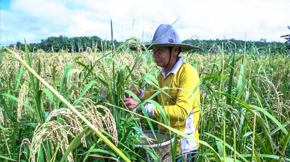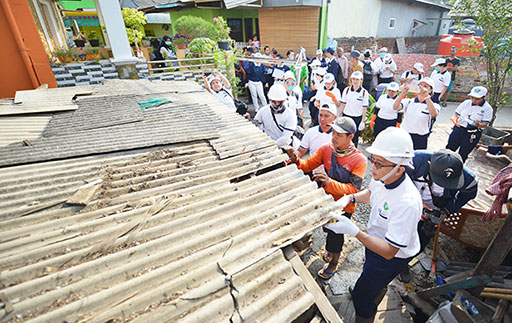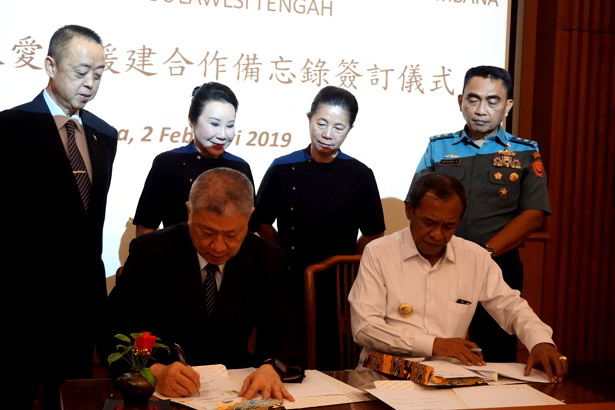Happy to See Family Once Again
Journalist : Metta Wulandari, Photographer : Anand YahyaA volunteer accompanied Rodiah (right) and Sahro (left) after the cataract surgery at Kodiam 0612/Tasikmalaya, August 24, 2018. The Tzu Chi Indonesia Buddhist foundation worked together with Kodim 0612 Tasikmalaya and Public Health Office to conduct the 122nd Tzu Chi Health Social Service.
Tzu Chi’s social health service often becomes a touching moment, especially when a cataract patient who couldn’t see before can finally re-capture a glimmer of light, as felt by Eva who accompanied her mother, Rodiah (59) and her grandfather, Sahro (86). When the bandages on their eyes were removed, they immediately felt emotional because they could see each other again.
Rodiah and Sahro had cataract in their eyes about a year ago. However, Rodiah could still see even though just a little bit. “At that time, she still did check up at the clinic regularly. She received medicine and it made her sight a bit better,” said Eva, Rodiah’s firstborn. Rodiah could still do her daily activities with no difficulty, starting from taking care of her house to sewing mukenas and Moslem gowns, Tasikmalaya style.
Previously, in her humble house, Rodiah and Eva usually sewed together with two sewing machines. Sewing mukenas and embroideries have indeed become a common occupation in Leuwiliang Village, because this village which is located in Kawalu district is one of the regions of embroidery center in Tasikmalaya. From there, many of the embroideries and sewing products are homemade, after that, they will be delivered to factories before being sold to various regions in Indonesia. One large mukena is worth 5,000 rupiah, while the small one is 2,000 rupiah. On average per person can sew 20 to 25 mukenas per day.
Cataract had made Rodiah’s eyes and her father’s, Sahro unable to see. Their activities have become limited due to this disease.
At that time, Rodiah’s family had sufficient income to afford the family’s daily needs because she was still actively sewing. However, Rodiah was forced to quit the job which she had done since teenager, because since May 2018 her right eye could no longer see anything. “I didn’t allow my mother to sew again because I was afraid that a needle would prick her finger, since her eye could no longer see,” said Eva.
Cataract does limit the activity and the movement of its victim and also drastically decreases the family’s quality of life. “If in a family there is one person suffering from cataract, it will make at least 3 people in that house unproductive. Who are those three people? First is the patient, then the other two family members, since they have to look after the patient alternately,” said Marudin Muhammad, respresenting the Tasikmalaya Public Health Office. Marudin further added that cataracts made those who were once active in earning a living now could no longer do it. The economy of the family decreases because of cataract.
Sure enough, after Rodiah could no longer sew, her family income automatically plummeted, but Eva did not complain. She still took care of her family and also looked after her mother. “I’ve never felt burdened by my parents, because I love them,” said Eva. In her perspective, a figure of a mother is a real example of strength and discipline. “My mother is a hard working woman, even though she was stern, we know that everything she has done, she did it because she loves us. Just like now, despite her blindness, she still helps us in separating the fabrics for sewing,” said the eldest of the 4 siblings.
Eva, Rodiah’s eldest daughter was still eager to help bear her family’s financial needs. After Rodiah could no longer sew because of her cataract, their family income was greatly decreased. Fortunately, her mother and grandfather had gotten the help from Tzu Chi for the surgery.
A smile and happiness were shining on Rodiah’s face (right) and Sahro’s (left) when the cataract surgery was done. Eva (middle) was holding back her emotion upon seeing her mother and grandfather being able to see again.
Eva’s wish to heal her mother’s and grandfather’s disease became bigger, however she waited for a government program to do the surgery. Usually, Tasikmalaya Public Health Office teams up with its local government each year to conduct social service for cataract. However, this year there was no social service being held. Fortunately this year, the Public Health Office worked together with Tasikmalaya Kodim 0612 and Tzu Chi Indonesia Buddhist foundation to conduct the 122nd Tzu Chi Health Service.
“I got the information from a man in TNI (Babinsa), I was delighted to know about this social service,” said Eva. When we joined the screening which was done by the Tzu Chi medic team at Tasikmalaya Kodim 0612 office(28/07/18), my mother’s and grandfather’s eyes were diagnosed for cataract and were ready to be operated.
At the social service held on August 24, 2018, Rodiah and Sahro became two of the patients who were successfully operated. They were 231 cataract patient, 8 pterygium patients, 15 hernia patients, 4 minor and 3 cleft lip patients who were successfully operated by the Tzu Chi medical team. “I’m very grateful to all the doctors and volunteers who have helped us. The moment that we’ve all been waiting for has come, we were saved,” said Eva emotionally. Meanwhile, Rodiah and grandfather Sahro’s faces were beaming with happiness.
Translated by Stefanny Doddy
Edited by Wida Maryani (Tzu Chi School)Related Articles

A Rice Farmer's New Hope
August 29, 2017Burhan cannot use his sense of sight not because he is blind. When he walks, he has to use his sense of touch or being guided by someone else. When he is alone, he will only be able to walk slowly and cautiously.

Building Kamal Muara Peoples Houses
July 16, 2019The building process of 10 houses in Kamal Muara village were started with demolition of the old houses. The demolition process were done by 300 teachers and staff of Tzu Chi School on July 9, 2019.









 Sitemap
Sitemap